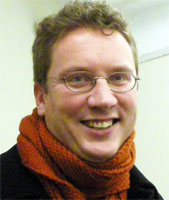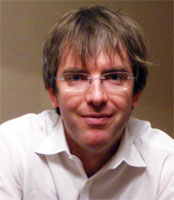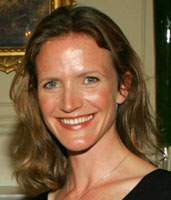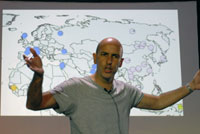LIFE: A GENE-CENTRIC VIEW
Craig Venter & Richard Dawkins: A Conversation in Munich
(Moderator: John Brockman)
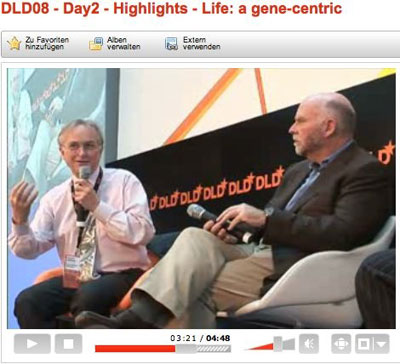
Richard Dawkins & J.Craig Venter
It's not everyday you have Richard Dawkins and Craig Venter on a stage talking for an hour about "Life: A Gene-Centric View". That it occured in Germany, where the culture has been resistant to open discussion of genetics, and at DLD, the Digital, Life, Design conference organized by Hubert Burda Media in Munich, a high-level event for the digital elite — the movers and shakers of the Internet — was particularly interesting. This event was a continuation of the Edge "Life: What a Concept!" meeting in August, 2008.
Edgeis pleased to report on the event: the complete one hour video; the verbatim transcript; a sampling of the press from event articles in Sueddeutsche Zeitung, Spiegel Online, and Stern.
Introduction

Thirty-two years ago, Richard Dawkins publishedThe Selfish Gene, one of the landmark books of the 20th Century. In it, he set forth the "gene's-eye" view of life.
"Individuals are not stable things," he wrote, "they are fleeting. Chromosomes too are shuffled into oblivion, like hands of cards soon after they are dealt. But the cards themselves survive the shuffling. The cards are the genes. The genes are not destroyed by crossing over, they merely change partners and march on. Of course they march on. That is their business. They are the replicators and we are their survival machines. When we have served our purpose, we are cast aside. But genes are the denizens of geological time: genes are forever."
"Notions like Selfish Genes, memes, and extended phenotypes are powerful and exciting," notes computer scientist W. Daniel Hillis. "They make me think differently. Unfortunately, I spend a lot of time arguing against people who have over interpreted these ideas. They're too easily misunderstood as explaining more than they do. So you see, this Dawkins is a dangerous guy. Like Marx. Or Darwin."
Part of Dawkins' danger is his emphasis on models derived from cybernetics and information theory, and that such models, when applied to our ideas of life, and in particular, human life, strike some otherwise intelligent people numb and dumb with fear and terror. According to psychologist Steven Pinker, "Dawkins's emphasis on the ethereal commodity called "information" in an age of biology dominated by the concrete molecular mechanisms is another courageous stance. There is no contradiction, of course, between a system being understood in terms of its information content and it being understood in terms of its material substrate. But when it comes down to the deepest understanding of what life is, how it works, and what forms it is likely to take elsewhere in the universe, Dawkins implies that it is abstract conceptions of information, computation, and feedback, and not nucleic acids, sugars, lipids, and proteins, that will lie at the root of the explanation."
Dawkins, an evolutionary biologist, is Charles Simonyi Professor For the Understanding of Science, Oxford University. His most recent book is the international bestseller,The God Delusion. (See Richard Dawkins's Edge Bio page)

Craig Venter, who decoded the human genome, is on the brink of creating the first artificial life form on Earth. "I have spent", he says, "the last fifteen years of his career doing, digitizing biology. That's what DNA sequencing has been about. I view biology as an analog world that DNA sequencing has taking into the digital world."
According to Venter (in his recent BBC Dimbleby Lecture "A DNA-Driven World"), "the future of life depends not only in our ability to understand and use DNA, but also, perhaps in creating new synthetic life forms, that is, life which is forged not by Darwinian evolution but created by human intelligence
"To some this may be troubling, but part of the problem we face with scientific advancement, is the fear of the unknown — fear that often leads to rejection...Science is a topic which can cause people to turn off their brains".
At the end of June, Venter announced the results of his lab's work on genome transplantation methods that allows for the transformation of one type of bacteria into another, dictated by the transplanted chromosome. In other words, one species becomes another. In talking to Edge about the research, Venter noted the following:
Now we know we can boot up a chromosome system. It doesn't matter if the DNA is chemically made in a cell or made in a test tube. Until this development, if you made a synthetic chromosome you had the question of what do you do with it. Replacing the chromosome with existing cells, if it works, seems the most effective to way to replace one already in an existing cell systems. We didn't know if it would work or not. Now we do. This is a major advance in the field of synthetic genomics. We now know we can create a synthetic organism. It's not a question of 'if', or 'how', but 'when', and in this regard, think weeks and months, not years.
Venter is Director, The J. Craig Venter Institute, and the author of the recently published autobiography, A Life Decoded: My Genome: My Life.(See Craig Venter's Edge Bio Page).
~~~
DLD, Europe's conference for the 21st century, took place January 20-22, 2008 at HVB Forum in Munich, Germany. DLD covers digital innovation, science and culture and brings together thought leaders from Europe, the Middle-East, America and Asia. The three-day event was chaired by Edge contributors publisher Hubert Burda (See "Hubert Burda — Germany's Agent of Change" on Edge) and investor Yossi Vardi and hosted by Stephanie Czerny and Marcel Reichart.

